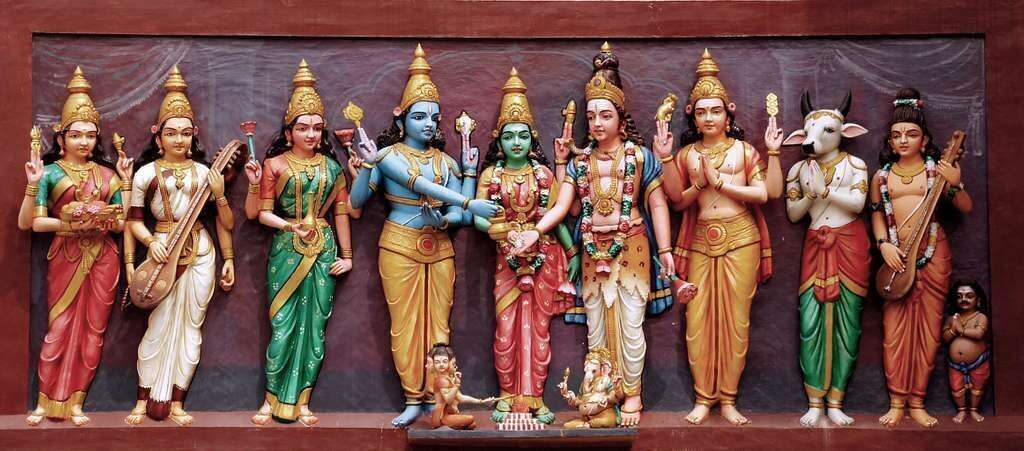The symbolism of Hindu gods and goddesses


Symbolism of Hindu Gods: Many deities standing together
The Importance of Devotion (Bhakti) in Hinduism: Understanding the Divine LoveThe Importance of Devotion (Bhakti) in Hinduism: Understanding the Divine LoveThe Importance of Devotion (Bhakti) in Hinduism: Understanding the Divine LoveHinduism is one of the oldest religions in the world, and it is known for its rich mythology and symbolism. In Hinduism, gods and goddesses are revered as the ultimate source of knowledge, power, and compassion. Each deity has its unique traits and attributes, and they are worshipped for different purposes. In this article, we will explore the symbolism of Hindu gods and goddesses and what they represent.
The Role of Hindu Gods and Goddesses in Hinduism
Hinduism acknowledges the existence of numerous gods and goddesses, making it a polytheistic religion. Each deity is associated with different aspects of life and nature, and they are worshipped for various reasons. In Hinduism, gods and goddesses are not seen as separate entities, but as different manifestations of the same divine energy. This divine energy is known as Brahman and is the source of all existence.
The Symbolism of Hindu Gods and Goddesses
Lord Ganesha: The Remover of Obstacles
Lord Ganesha is one of the most popular Hindu gods, and he is worshipped as the remover of obstacles. He is depicted as having an elephant’s head and a human body, and he is often seen holding a lotus flower and a sweet. The elephant’s head symbolizes wisdom, while the human body represents the physical world. Lord Ganesha’s sweet is a symbol of the sweet rewards that come after overcoming obstacles.
Goddess Lakshmi: The Goddess of Prosperity and Wealth
Goddess Lakshmi is the goddess of wealth and prosperity, and she is worshipped for good fortune and success. She is depicted as having four arms and holding a lotus flower and a pot of gold coins. The lotus flower symbolizes purity, while the pot of gold coins represents wealth and prosperity.
Lord Shiva: The Destroyer of Evil
Lord Shiva is one of the most powerful Hindu gods, and he is worshipped as the destroyer of evil. He is often depicted as having a third eye and holding a trident. The third eye represents spiritual insight, while the trident symbolizes the three aspects of existence: creation, preservation, and destruction.
Goddess Durga: The Divine Mother
Goddess Durga is worshipped as the divine mother and the protector of the universe. She is depicted as having ten arms and holding weapons such as a sword, a bow, and an arrow. The ten arms represent the ten directions, and the weapons symbolize her power to protect her devotees from evil.
Lord Krishna: The God of Love and Compassion
Lord Krishna is worshipped as the god of love and compassion and one of the most beloved Hindu gods. He is often depicted as having a blue complexion and playing a flute. The blue complexion represents the infinite sky, while the flute symbolizes the harmony of existence.
Understanding the Deeper Meanings
The symbolism of Hindu gods and goddesses is not just limited to their physical appearance and attributes, but it also represents deeper philosophical concepts. For example, the elephant head of Lord Ganesha represents the ability to discriminate between good and evil, while the lotus flower represents the purity of the mind.
Similarly, the ten arms of Goddess Durga represent the ten directions and the ten elements of creation, while the weapons represent the power to overcome evil. The trident of Lord Shiva represents the three aspects of existence: creation, preservation, and destruction, and the third eye represents spiritual insight.
Conclusion
The stories and mythology associated with these deities have inspired countless devotees to connect with their spirituality and seek a deeper understanding of the world around them. The symbolism of these gods and goddesses is not just limited to their physical representations but extends to the deeper meanings that they embody.
When one understands the deeper meanings of these symbols, it can lead to a profound realization of the interconnectedness of all things. It can bring a sense of peace and harmony, knowing that we are all part of a larger cosmic design.
In the hustle and bustle of modern life, it is easy to forget the importance of spirituality and the significance of these ancient symbols. However, by exploring the symbolism of Hindu gods and goddesses, one can gain a deeper appreciation of the beauty and complexity of life.
These deities serve as a reminder that there is more to life than what meets the eye. They remind us of the power of faith and the importance of spiritual growth.
In conclusion, the symbolism of Hindu gods and goddesses is not just a matter of religious belief, but it is a reflection of the deeper philosophical and spiritual concepts that have been explored for thousands of years. As we delve into these symbols, we can uncover profound insights about our inner selves and the intricacies of the world we inhabit. We can connect with our spirituality and find peace in chaos.
FAQs
- Are Hindu gods and goddesses worshipped by Hindus alone? No, these deities are revered by people of all faiths and cultures across the world.
- Why does Lord Ganesha have an elephant head and what is its meaning? The elephant head represents wisdom and the ability to discriminate between good and evil.
- How does understanding the symbolism of these deities help in spiritual growth? By understanding the deeper meanings of these symbols, we can gain a deeper appreciation of the beauty and complexity of life, and connect with our spirituality.
- Is it necessary to be a Hindu to appreciate the symbolism of these deities? No, anyone can appreciate the symbolism of these deities and their significance in Hindu mythology and philosophy.
- What can we learn from the symbolism of Hindu gods and goddesses? The symbolism of these deities can teach us about the interconnectedness of all things and the importance of faith and spiritual growth.
Recent Posts
5 Key Insights: The Significance of Yoga in Modern Life from a Hindu Perspective
Yoga, an ancient practice rooted deeply in the spiritual soil of Hinduism, has traversed a…
10 Transformative Reasons: The Spiritual Guide to Eating with Hands in Hinduism
Introduction In the age of fast food and instant gratification, the serene practice of eating…
10 Unbreakable Connections Between Hinduism and Environmental Sustainability: A Comprehensive Guide
Introduction Hinduism, one of the world's oldest religions, is more than a mere spiritual path;…
7 Timeless Principles of Non-Violence in Hinduism: A Comprehensive Guide
Introduction: Embracing Non-Violence in Hinduism The Profound Connection Between Non-Violence and Hinduism Non-violence, or Ahimsa,…
7 Transformative Powers of Yagya in Hinduism: A Complete Guide to Spiritual Rituals
Introduction to Yagya in Hinduism: A Spiritual Exploration Yagya, also spelled Yajna, is a profound…
The Deep-rooted Significance of Copper in Hinduism: 7 Enlightening Insights
Introduction Copper, with its gleaming reddish-brown allure, isn't just a metal to the spiritually profound…


View Comments